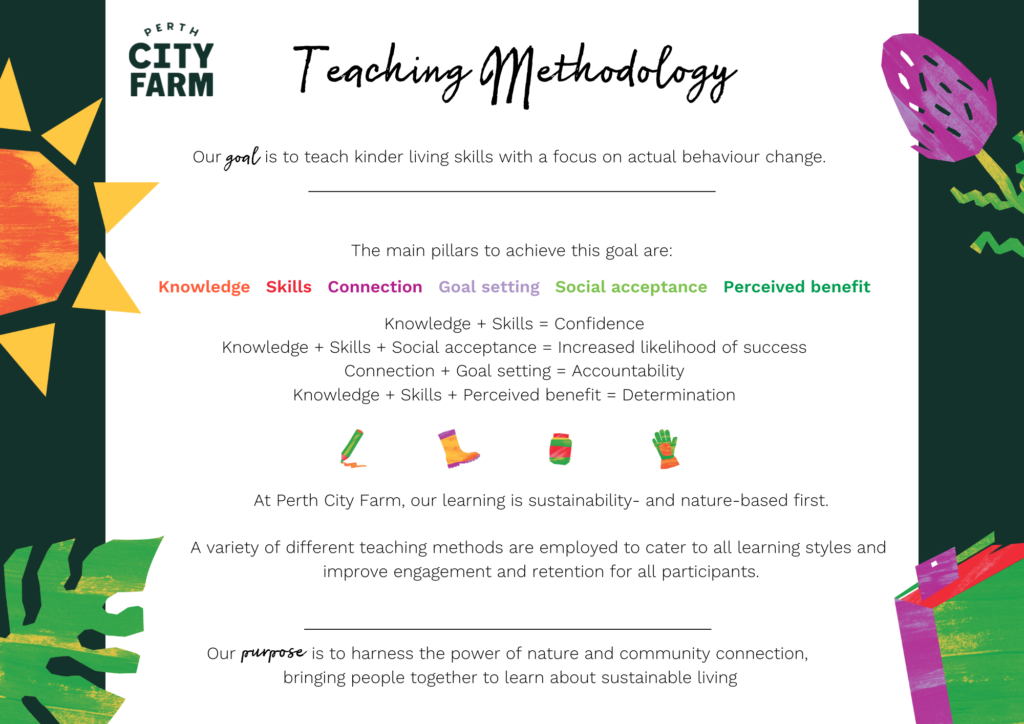We provide education opportunities for individuals and businesses, including talks, workshops, courses, volunteering, and school excursions in order to promote the importance of protecting the natural environment, and provide information about sustainable living practices. We are very intentional about the way we design our education programs so that they create our target impact- the people of Perth living connected, sustainable lives.
To the participant a workshop or volunteering day could just feel like a fun experience- but the way we run the session means the fun experience is likely to lead to measurable sustainability related behaviour change.
The key ingredients to achieving behaviour change
Knowledge alone is rarely enough to change behaviour. A level of skill, confidence and goal setting are equally as important. Addressing barriers to behaviour change is also important and should be part of the teaching session.
Knowledge is important to explain why the behaviour change is needed. An emotional connection or reason for change needs to be established to foster the will to change in participants. Gaining a level of skill is necessary to continue the behaviour outside of class and will increase the level of confidence in the participant. Goal setting increases accountability, especially if it is done publicly in front of a group and there is follow-up at a later point in time.
Perceived social acceptance of the new behaviour is an important part of how successful the behaviour change is going to be, so feeling connected to a like-minded community (‘finding one’s tribe’) is a beneficial element, which coincides with our value of connecting community.
Another important factor needing to be addressed is the immediate perceived benefit which rewards the behaviour change. What do participants gain when they change their behaviour? This can be a tangible benefit (saving money, better health) or intangible (emotions, recognition).
Diverse learning Styles
There are four main learning styles recognized in common educational resources: auditory, visual, reading/writing, and kinesthetic, but most likely more exist.
While a diversity in teaching methods is good for everyone, there is little to no evidence to prove there being any advantage to matching teaching methods to preferred learning styles. Applying more than one avenue of learning keeps all students engaged though, and gives more opportunity for the learning of knowledge and skills, and for both to be retained. The majority of research suggests that repetition of content through different teaching avenues is the ideal for behaviour change, i.e. hearing it, seeing it, doing it.
Teaching Methods at Perth City Farm
At Perth City Farm, our learning should be sustainability- and nature-based first. We encourage all educators to include indigenous knowledge into their works, for example through using the Noongar seasons, as well as native plants and animals. We want to foster the concept of having an ethical responsibility in our teachings, but we are keeping it positive and solutions-focused.
Ideally, all of our learning experiences have elements from more than one of the following
- Lecture-based learning – traditional teaching where a teacher imparts knowledge through speaking
- Group learning – collaborative learning where all participants become teachers
- Individual learning – for example through individual tasks in class or as homework
- Inquiry-based learning – learning by discovery through starting with a question
- Kinesthetic learning – skills-based ‘learning by doing’, instructed practical work experience
- Expeditionary learning – learning through participating in practical experiences
- Game-based learning – playful learning experiences through games
- Challenge-based learning – solving a real-world challenge
- Place-based learning – cultural and contextual experience which begins with ‘place’ as the starting point
- Play-based learning – often unstructured; how children learn best
- Service-based learning – achieving real objectives for the community while developing a deeper understanding and skills for themselves
Connecting participants is a crucial element of all our education endeavours as connection with likeminded people increases social acceptability of the intended behaviour changes and accountability for our goal setting.
Group size can have a large influence on the effectiveness of education. Ideal group size depends on the type of education offering. Perth City Farm tends to keep to smaller groups of up to 20 learners for most offerings to ensure effective learning. Depending on the workshop type this can be adjusted up and down.


